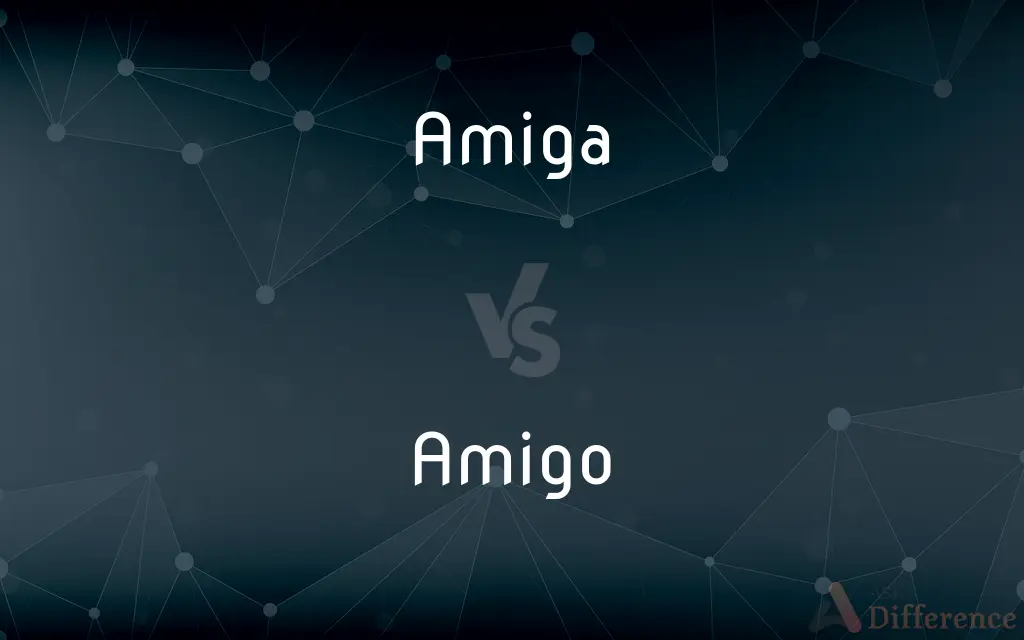Amiga vs. Amigo — What's the Difference?
By Tayyaba Rehman & Urooj Arif — Updated on April 19, 2024
Amiga refers to a female friend in Spanish, emphasizing platonic relationships; Amigo denotes a male friend, commonly used in various contexts.

Difference Between Amiga and Amigo
Table of Contents
ADVERTISEMENT
Key Differences
Amiga is a Spanish noun specifically used for a female friend, highlighting gender-based linguistic distinctions in Spanish. On the other hand, Amigo is used to refer to a male friend, reflecting the gender-specific usage in informal and familiar settings.
In conversations, "amiga" is often used to address or refer to a female peer or companion, emphasizing a personal connection. Whereas "amigo" is used similarly but for male counterparts, underscoring the gender distinctions inherent in Spanish noun forms.
Cultural nuances also play a role; "amiga" can connote a close but non-romantic relationship in Spanish-speaking cultures. Conversely, "amigo" is universally recognized beyond Spanish-speaking communities, often used in English to denote friends or allies informally.
The usage of "amiga" can also reflect social dynamics, such as in groups or gatherings predominantly comprising women. In contrast, "amigo" might be used in more mixed or broadly social contexts, highlighting its adaptability.
The term "amiga" carries a warm, intimate connotation, often used affectionately among female friends. On the other hand, "amigo" is casual and can be used both affectionately and in passing, demonstrating its versatile nature in interpersonal relationships.
ADVERTISEMENT
Comparison Chart
Gender
Female
Male
Usage Context
Personal, informal
Broad, informal
Cultural Reach
Spanish-speaking
Global
Connotation
Intimate, warm
Casual, friendly
Linguistic Form
Feminine
Masculine
Compare with Definitions
Amiga
A woman companion.
I will meet my amiga at the café.
Amigo
Used in casual and mixed-gender talks.
My amigo will join us later.
Amiga
A term of endearment for a female peer.
Hola, amiga! How are you?
Amigo
Informal term for a male acquaintance.
Hey, amigo! Long time no see.
Amiga
Used in female-centric conversations.
My amiga and I love this movie.
Amigo
A man who is a companion.
I am going fishing with an amigo.
Amiga
Female friend in Spanish.
Maria is my amiga from school.
Amigo
Male friend in Spanish.
Carlos is my amigo from work.
Amiga
Reflects gender-specific communication.
She is a trusted amiga in our group.
Amigo
Often adopted in non-Spanish speaking contexts.
He’s a good amigo to have.
Amiga
The Amiga is a family of personal computers introduced by Commodore in 1985. The original model is one of a number of computers with 16- or 32-bit processors, 256 KB or more of RAM, mouse-based GUIs, and significantly improved graphics and audio compared to previous 8-bit systems.
Amigo
A friend.
Amiga
(Latin American) A female friend.
Amigo
(informal) A friend.
Amigo
Mexican.
Amigo
(historical) A native of the Philippines who was friendly toward the Spanish.
Amigo
A friend; - a Spanish term applied in the Philippine Islands to friendly natives.
Amigo
A friend or comrade
Common Curiosities
How does the use of amiga or amigo affect conversation tone?
Using amiga or amigo can make the conversation more personal and friendly.
Is it appropriate to use amigo for someone who is not a close friend?
Yes, amigo can be used casually for acquaintances or in a friendly manner.
Is the pronunciation of amiga and amigo different?
The pronunciation is similar, but the gendered endings differ: amiga ends with "a", and amigo ends with "o".
Are these terms used outside of Spanish-speaking countries?
Amigo is frequently used globally, while amiga is generally confined to Spanish-speaking contexts.
Do amiga and amigo have plural forms?
Yes, the plural forms are amigas for females and amigos for males.
Can amiga and amigo be used interchangeably?
No, they cannot be used interchangeably as they refer to different genders.
What is the main difference between amiga and amigo?
Amiga refers to a female friend, and amigo refers to a male friend, adhering to Spanish gender rules.
Can amiga be considered a term of endearment?
Yes, amiga is often used affectionately among close female friends.
Is amigo used in English?
Yes, amigo is widely used in English as a casual term for a friend.
Can these terms be used formally?
They are generally informal, though they can appear in formal contexts as part of direct address.
Share Your Discovery

Previous Comparison
Induction vs. Initiation
Next Comparison
Thermosphere vs. MesosphereAuthor Spotlight
Written by
Tayyaba RehmanTayyaba Rehman is a distinguished writer, currently serving as a primary contributor to askdifference.com. As a researcher in semantics and etymology, Tayyaba's passion for the complexity of languages and their distinctions has found a perfect home on the platform. Tayyaba delves into the intricacies of language, distinguishing between commonly confused words and phrases, thereby providing clarity for readers worldwide.
Co-written by
Urooj ArifUrooj is a skilled content writer at Ask Difference, known for her exceptional ability to simplify complex topics into engaging and informative content. With a passion for research and a flair for clear, concise writing, she consistently delivers articles that resonate with our diverse audience.
















































